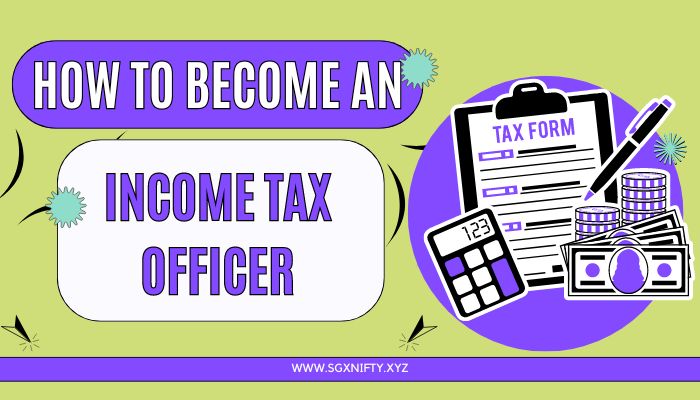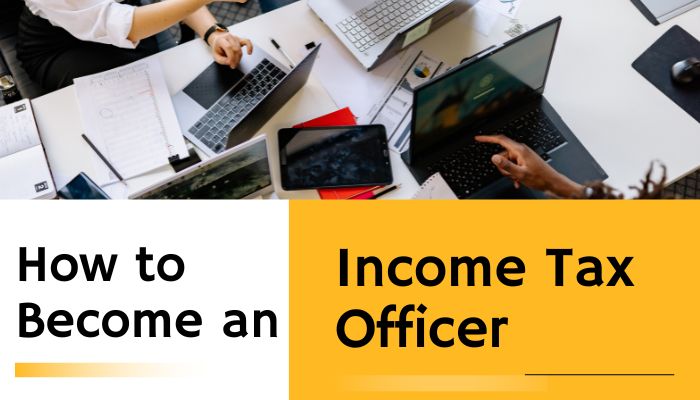
Welcome to our ultimate guide on becoming an Income Tax Officer in 2025! This comprehensive post will walk you through every aspect of this rewarding career, from qualifications to recruitment strategies.
In today’s economic landscape, the role of an Income Tax Officer is crucial in ensuring fiscal compliance and upholding the integrity of the tax system.
Whether you’re a recent graduate or a seasoned professional, this guide will equip you with the knowledge and resources to embark on this exciting journey.
So, if you’re ready to take the first step towards a fulfilling career dedicated to public service and financial accountability, let’s dive into our comprehensive 2025 guide on How to become an Income Tax Officer.
What does it mean to be an Income Tax Officer?
Being an Income Tax Officer entails working within the Income Tax Department under the Central Board of Direct Taxes (CBDT).
Tax professionals handle various income tax matters and ensure compliance with tax laws.
As part of the Ministry of Finance, Income Tax Officers conduct investigations and assessments related to income tax.
Individuals and organizations rely on them to ensure compliance with tax regulations.
How To Become An Income Tax Officer?

One can pursue a career as an Income Tax Officer either by clearing the SSC Combined Graduate Level (CGL) examination or by qualifying for the Indian Revenue Service (Income Tax) through the UPSC Civil Services Examination.
Unlocking the prestigious realm of an Income Tax Officer isn’t a direct path; it’s a journey marked by strategic steps.
Begin your ascent by embracing the role of an Income Tax Inspector, a pivotal stepping stone on the way to your ultimate goal.
Through dedication and proficiency, seize the opportunity for advancement through departmental promotion, paving your way into the esteemed position of an Income Tax Officer.
The gateway to this journey lies in conquering the Staff Selection Commission-Combined Graduate Level (SSC CGL) exam.
Below, discover the roadmap to realizing your dream of becoming an Income Tax Officer through the SSC CGL exam:
1. Attain a Bachelor’s Degree
To qualify for the CGL exam, you need a bachelor’s degree. Complete your undergraduate studies in any field to be eligible for the CGL exam. Once you’ve graduated, ensure you meet all the necessary criteria to sit for the exam.
2. Fulfill Eligibility Criteria
- Before sitting for the CGL exam, ensure you meet all eligibility requirements. You must hold a bachelor’s degree from a recognized institution. The age limit is between 18 to 30 years, with relaxations for certain categories:
- SC/ST: five-year relaxation
- OBC: three-year relaxation
- Persons with Disabilities (PWD) (Unreserved): 10-year relaxation
- PWD (OBC): 13-year relaxation
- PWD (SC/ST): 15-year relaxation
- Residents of Jammu and Kashmir (1980-1989): five-year relaxation
- Defence personnel disabled in operation: three-year relaxation
- Defence personnel disabled in operation (SC/ST): eight-year relaxation
Citizenship requirements include the following:
- Indian citizen
- Nepalese or Bhutanese subject
- Tibetan refugee who arrived in India before January 1, 1962, with the intention of permanent settlement
- Individual of Indian origin moving to India permanently from specified countries Candidates of non-Indian nationality need a certificate of eligibility from the Indian government.
Physical requirements include running one mile within a specified time, with height and chest size criteria varying by region. The weight requirement is 47 to 50 kg, depending on the region.
3. Apply for the SSC-CGL Exam
Once you’ve met all the eligibility criteria, it’s time to apply for the SSC-CGL exam online.
The application fee is ₹100, except for candidates from the SC, ST, PWD, and ex-servicemen categories who are exempt from paying.
The application process involves two parts: Part I, which is one-time registration, and Part II, which involves filling out the exam application.
The SSC-CGL exam consists of three tiers, and successfully passing all three levels qualifies you to become an income tax inspector.
4. Take the Tier I Exam
The Tier I exam, also known as the prelims test, is a computer-based exam comprising solely of objective-type multiple-choice questions.
It serves as a qualifying exam, with its marks not factored into the final ranking.
The Tier I exam covers four subjects: general intelligence and reasoning, general awareness, quantitative aptitude, and English comprehension.
Passing this exam allows you to proceed to the Tier II exam.
5. Take the Tier II Exam
The Tier II exam, also referred to as the mains exam, is also conducted in a computer-based format and consists of objective-type multiple-choice questions like Tier I.
Tier II consists of four papers, with Papers I and II being mandatory for all candidates. Papers III and IV are for candidates applying for specific posts.
Paper I assesses quantitative abilities with 200 marks, while Paper II focuses on English language and comprehension, also worth 200 marks.
Marks obtained in the Tier II exams significantly contribute to the final ranking.
6. Take the Tier III Exam
Tier III involves a descriptive paper in either English or Hindi, conducted in pen-and-paper mode.
The final ranking is based on the score of this paper, which carries 100 marks.
In contrast to previous levels, candidates have one hour to complete this paper without any negative marking.
7. Fulfill Document Verification and Medical Examination
Candidates are shortlisted by the commission for document verification based on their performance in Tiers II and III.
Following document verification, shortlisted candidates undergo a medical fitness examination.
Those who meet the physical requirements and pass the medical examination are eligible to become inspectors in the income tax department.
8. Qualify for the Departmental Exam for Income Tax Officer
After three years of service as an inspector, you qualify for promotion to the position of income tax officer.
To attain this promotion, passing two exams is necessary: the departmental confirmation exam and the income tax officer departmental promotion exam.
The latter comprises 100 multiple-choice questions, totaling 200 marks, and lasts for two hours. Successful completion of this exam paves the way for promotion to income tax officer, subject to available vacancies and your seniority.
Unveiling the Responsibilities of an Income Tax Officer in India
Income Tax Officers in India play a crucial role in enforcing tax laws and regulations. Their duties include:
| Duty | Description |
|---|---|
| Tax Assessment | Assess and evaluate income tax returns filed by individuals, businesses, and entities. Review information for accuracy and compliance with tax laws. |
| Tax Collection | Oversee collection of taxes owed to the government, including income tax and corporate tax. Coordinate with taxpayers and stakeholders for timely payment. |
| Tax Investigation | Conduct investigations into suspected cases of tax evasion or fraud. Gather evidence and analyze financial records to uncover irregularities. |
| Tax Audits | Verify accuracy and completeness of tax returns through audits. Review financial documents and conduct on-site inspections as necessary. |
| Tax Disputes Resolution | Resolve disputes between taxpayers and tax authorities. Review assessments, conduct negotiations, and facilitate settlements. |
| Taxpayer Education | Provide guidance and assistance to taxpayers regarding tax laws, filing requirements, and compliance procedures. Educate taxpayers on their rights and duties. |
5 Essential Skills Every Tax Officer Needs for Success
1. Numeracy:
Income tax officers delve into the financial intricacies of individuals, corporations, and government entities. A firm grasp of arithmetic is indispensable for this profession.
2. Attention to Detail:
Meticulousness is key as income tax officers meticulously research, survey, correct, and evaluate tax-related matters. Every detail matters in ensuring accuracy and compliance.
3. Communication:
Interacting with a diverse array of professionals, including accountants, attorneys, and colleagues, is a fundamental aspect of the role. Strong communication skills are essential for effective collaboration.
4. Problem-solving:
Navigating through complex tax claims and resolving discrepancies demands sharp problem-solving abilities. Income tax officers must adeptly address challenges to ensure fair and accurate tax assessments.
5. Time Management:
Balancing the demands of the job, especially during peak periods like the fiscal year-end, requires excellent time management skills. Ensuring timely and accurate filings while preventing fraud necessitates efficient allocation of resources.
Salary Breakdown for Income Tax Officers
Discover the monetary rewards awaiting income tax officers. Dive into the detailed salary structure across various positions within the department.
| Position | Pay Scale | Grade Pay |
|---|---|---|
| Income Tax Officer | ₹9,300-34,800 | ₹4,800/₹5,400 |
| Assessing Officer Cadre | ₹15,600-39,100 | ₹6,600/₹9,300-34,800/₹4,200 |
| Private Secretary Cadre | ₹9,300-34,800 | ₹4,800/₹4,200 |
| Inspector of Income Tax | ₹9,300-34,800 | ₹4,600 |
| Executive Assistants | ₹9,300-34,800 | ₹4,200 |
| Tax Assistant/Steno III/Driver | ₹5,200-20,200 | ₹2,400 |
| Notice Server/Lower Divisional Clerk/Driver | ₹5,200-20,200 | ₹1,900 |
| Group C | ₹5,200-20,200 | ₹1,800 |
| Posts in Electronic Data Processing Cadre | ₹15,600-39,100/₹5,200-20,200 |
*Salary figures reflect data listed on the quoted websites at time of writing. Salaries may vary depending on the hiring organisation and a candidate’s experience, academic background and location.
Conclusion
Embarking on the journey to become an Income Tax Officer in India requires dedication, perseverance, and a commitment to upholding the nation’s tax laws. By following the outlined steps and staying focused on your goals, you can pave the way for a rewarding career in public service.
FAQs
1. What is the eligibility criteria for becoming an Income Tax Officer?
Candidates must hold a bachelor’s degree from a recognized university or institution to be eligible for the position.
2. Is prior work experience required?
No, prior work experience is not mandatory. However, candidates with relevant experience may have an advantage during the selection process.
3. How competitive is the selection process?
The selection process, particularly the Civil Services Examination, is highly competitive, requiring thorough preparation and dedication.
4. Can foreign nationals apply for the position?
No, only Indian citizens are eligible to apply for the position of Income Tax Officer.
5. What is the career progression like for Income Tax Officers?
Income Tax Officers have ample opportunities for career growth through promotions, specialized training, and skill development programs.
6. Are there any age restrictions for aspiring candidates?
Candidates must be between 21 and 32 years of age to appear for the Civil Services Examination, with relaxations provided for certain categories as per government norms.
